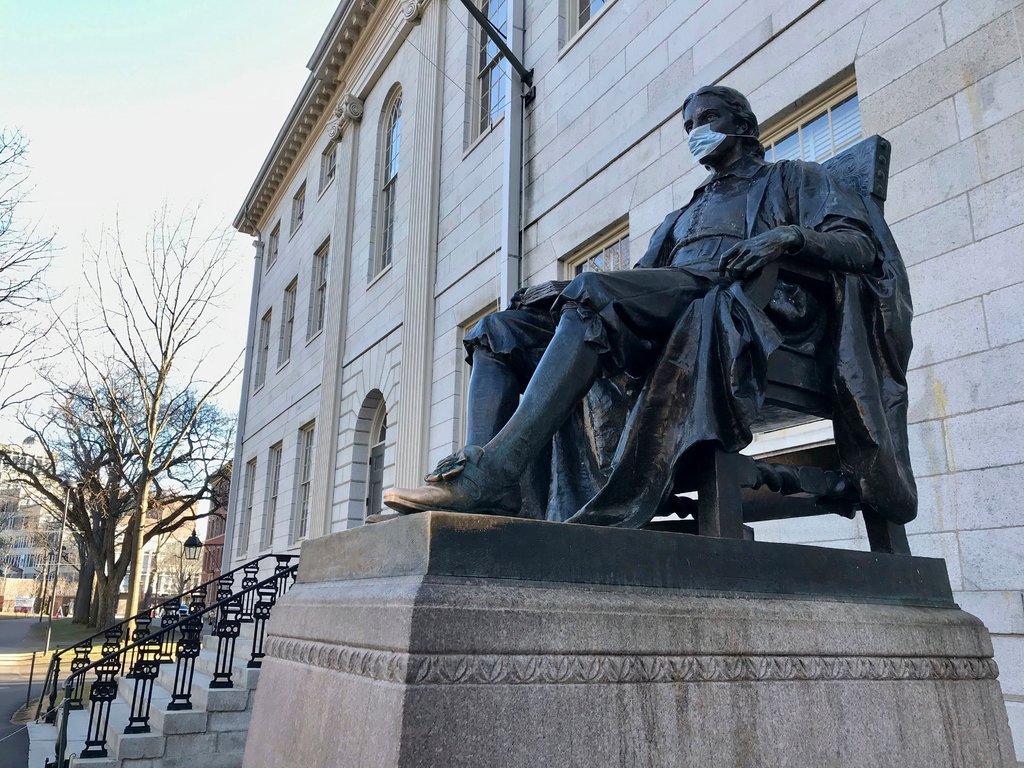We Lead Three Universities. It’s Time for Drastic Action.
破天荒的,美國哈佛大學、MIT 大學、史丹佛大學等三所知名大學校長,於美國時間三月十七日在 New York Times 上發表聯名信,說明作為領頭的大學學府,針對新冠病毒 (COVID-19) 的全球擴散,必須積極作為的時間已經到了。聯名信並不長,主要在提醒學校採取遠距教學所帶來的不便,是必要且無從避免的,並請大家共同忍受這段艱難的時刻,以給予防疫機構及研發人員足夠的時間找出應對新冠病毒的方法及疫苗。以下是信的全文。
We Lead Three Universities. It’s Time for Drastic Action.
Organizations nationwide need to get ahead of the coronavirus, even if it’s not in their community yet.
By Lawrence S. Bacow, L. Rafael Reif and Marc Tessier-Lavigne
Dr. Bacow is the president of Harvard. Dr. Reif is the president of M.I.T. Dr. Tessier-Lavigne is the president of Stanford.
New York Times, March 17, 2020

The John Harvard statue at Harvard University as students prepared to leave campus on Saturday.Credit...Colin Binkley/Associated Press
The arrival of the new coronavirus is teaching us all what a pandemic demands of us. As leaders of three institutions fortunate to have access to outstanding public health research, we quickly came to understand in recent weeks that if we wanted to help protect the health of our nation, we had to take drastic action.
Experts advised us that to slow the spread of the virus, we must reduce population density and increase social distancing on our campuses. That meant turning university life upside down: suddenly sending virtually all of our undergraduates home; asking faculty to swiftly bring all instruction online; canceling academic, athletic, artistic and cultural events, and nearly all in-person meetings; shutting our libraries; and asking everyone who could work remotely to do so right away.
Initially, these actions felt awful, and uncomfortably extreme — even to those of us in charge. And the practical consequences have been difficult for everyone.
So, is all this disruption really necessary?
We believe the answer is yes.
The experience of other countries has shown the crucial value of making big moves as quickly as possible to “flatten the curve” — to slow the rate of infection so that our hospitals and health care workers are not overwhelmed.
Hundreds of other U.S. institutions are taking similar, painful steps. Many states and cities have already taken important actions: limiting the size of gatherings, shuttering bars and restaurants, closing schools.
But other communities and organizations, where the risk may still feel vague or remote, are still deciding. Based on what we are learning from our own experience, and the accelerating spread of the disease, we urge you to act quickly and boldly.
Regardless of the number of cases in your community, the time to act is right now: Public health experts tell us that as a society, the steps we take this week will have an immense impact on determining whether this crisis becomes a catastrophe.
In the United States, our normal way of life spreads the coronavirus with incredible efficiency and speed. So — for weeks or months to come — we will all have to help one another accept and tolerate the discomforts of a very un-normal life. If we do not do enough, together, the price will be the health and safety of our communities, our neighbors and our friends — with potentially dire consequences for the most vulnerable.
The self-discipline of social distancing is something we can all help with — and that shared effort will buy time for the biomedical community to invent solutions.
Researchers at universities like ours are among those in this fight. Some are developing faster, less expensive coronavirus tests that can be manufactured quickly in large quantities. Others are racing to find vaccines and treatments. Still others are uncovering ways to interrupt the pathways of a pandemic and to better manage the systems problems that swamp hospitals with more patients than they can treat. And others are working on strategies to reduce the tremendous burdens on our nation’s health care workers.
Our universities are making significant contributions to this public health effort. And of course, this national emergency depends on national action, from the federal government and states, cities, communities, corporations and organizations of every size — down to every single individual.
Some may be concerned that this is all an overreaction. But given what we have learned in these past few weeks, we are convinced that taking difficult steps now, for the public good, will mean getting back to normal in the future with fewer friends and colleagues to mourn.
- Note: Photos, text, or video at here are taken from the public website without intention to infringe their copyrights.
點閱人數 : 17263



